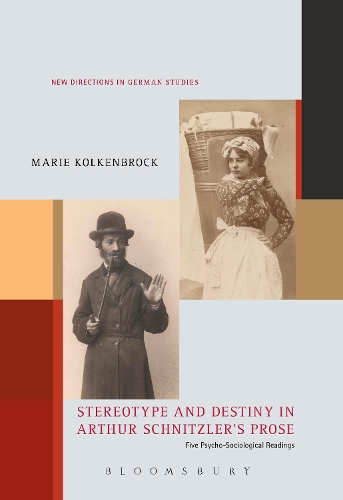
Stereotype and Destiny in Arthur Schnitzlers Prose: Five Psycho-Sociological Readings
(Hardback)
Available Formats
Publishing Details
Stereotype and Destiny in Arthur Schnitzlers Prose: Five Psycho-Sociological Readings
By (Author) Dr Marie Kolkenbrock
Bloomsbury Publishing PLC
Bloomsbury Academic USA
8th February 2018
United States
Classifications
Tertiary Education
Non Fiction
833.8
Physical Properties
Hardback
280
Width 140mm, Height 216mm
472g
Description
What was the function of the invocation of destiny in the increasingly secularized era of turn-of-the-century Vienna By exploring this question, Stereotype and Destiny in Arthur Schnitzler's Prose offers a new psycho-sociological perspective on the narrative works of Arthur Schnitzler. While Vienna 1900 as a site of crisis has been established in the scholarship, this book focuses on the presence of forces that deny the existence of said crisis and work to contain its subversive and critical potential. Stereotype and destiny emerge in Schnitzlers prose texts as a form of these counter-critical forces. In her readings, Kolkenbrock shows that stereotype and destiny serve as an interrelated coping mechanism for a central psychological conflict of modernity: the paradoxical need to be recognized as normal and special at the same time. While, through the complex of "stereotype and destiny," Schnitzlers prose addresses central modern questions of identity and subjecthood, Kolkenbrocks close readings also reveal how the texts inscribe themselves aesthetically in the literary tradition of Romanticism and as such offer crucial sources for understanding Schnitzlers representations of embattled subjecthood within broader social and aesthetic traditions.
Reviews
This studys nuanced and remarkably cohesive readings are well-versed in social theory, cultural history, and narratology. Going beyond the established discourse of crisis in early twentieth-century Vienna, Kolkenbrock homes in on the belief in destiny as an indicator of crisis as well as an effect that reinforces existing power structures. In addition to making a substantial contribution to Schnitzler scholarship, her book offers a thorough examination of the complex of stereotyping, which illuminates broader psychosociological phenomena. * Austrian History Yearbook *
Kolkenbrocks book provides a compelling analysis of the much-studied crises of subjectivity in fin-de-sicle Vienna by focusing with laser-like precision on the interplay between stereotypes and destiny in Schnitzlers prose fiction. It earns its place alongside previous studies of Schnitzler and the crisis of identity and should serve to inspire further work in this area. * The German Quarterly *
This fresh and original contribution to the scholarly literature on Arthur Schnitzler is informed by critical paradigms of poststructuralism (particularly Judith Butler and Pierre Bourdieu) and builds a strong theoretical foundation for original readings of several of his prose works One of the strengths of this study is its broad definition and problematization of the concept of stereotyping This monograph is unfailingly lucid in its argumentation and contains a comprehensive apparatus that will be useful to scholars, students, and interested readers. The author is clearly well read in social theory and narratology and brings this nuanced perspective to her readings of individual texts. It is part of the exciting New Directions in German Studies series from Bloomsbury and is a valuable addition to Schnitzler scholarship. -- Felix Tweraser * Journal of Austrian Studies *
Kolkenbrocks original reading of Arthur Schnitzlers narrative prose both identifies the hidden normative agenda dominating Viennese society around 1900 and attends to Schnitzlers complex view of the human psyche. As Kolkenbrock lucidly shows, Schnitzlers protagonists seek individual autonomy in a society in which stereotypes about sex, race, and culture delimit the parameters of their actions. Kolkenbrock reveals that this futile search for autonomy inevitably leads Schnitzlers protagonists to the figure of the 'other'one in conflict with the normative orderyet these encounters ultimately do not provide a sustained escape from societal restraints. * Carl Niekerk, Professor of German, Comparative and World Literature, and Jewish Studies, University of Illinois at Urbana-Champaign, USA, and editor of German Quarterly and Lessing Yearbook *
Kolkenbrock's elegant and original study discovers 'destiny' as a term for the missing substance of subjectivity in Schnitzler's prose works. By defining the different relations between an individual character's encounter with a sense of destiny, on one hand, and the operation of social stereotyping, on the other, she constructs a supple theoretical tool. The resulting analysis gives a beautifully lucid, but also subtly differentiated, account of how Schnitzler's work embodies the impossible challenge confronting personhood not only in fin-de-sicle Austro-Hungarian reality, but arguably in modernity in general: how to be normal and special at the same time. * Michael Minden, Former Reader in Modern German Literature and Culture and Emeritus Fellow of Jesus College, University of Cambridge, UK *
Author Bio
Marie Kolkenbrock is a Branco Weiss Fellow at King's College London, UK.
